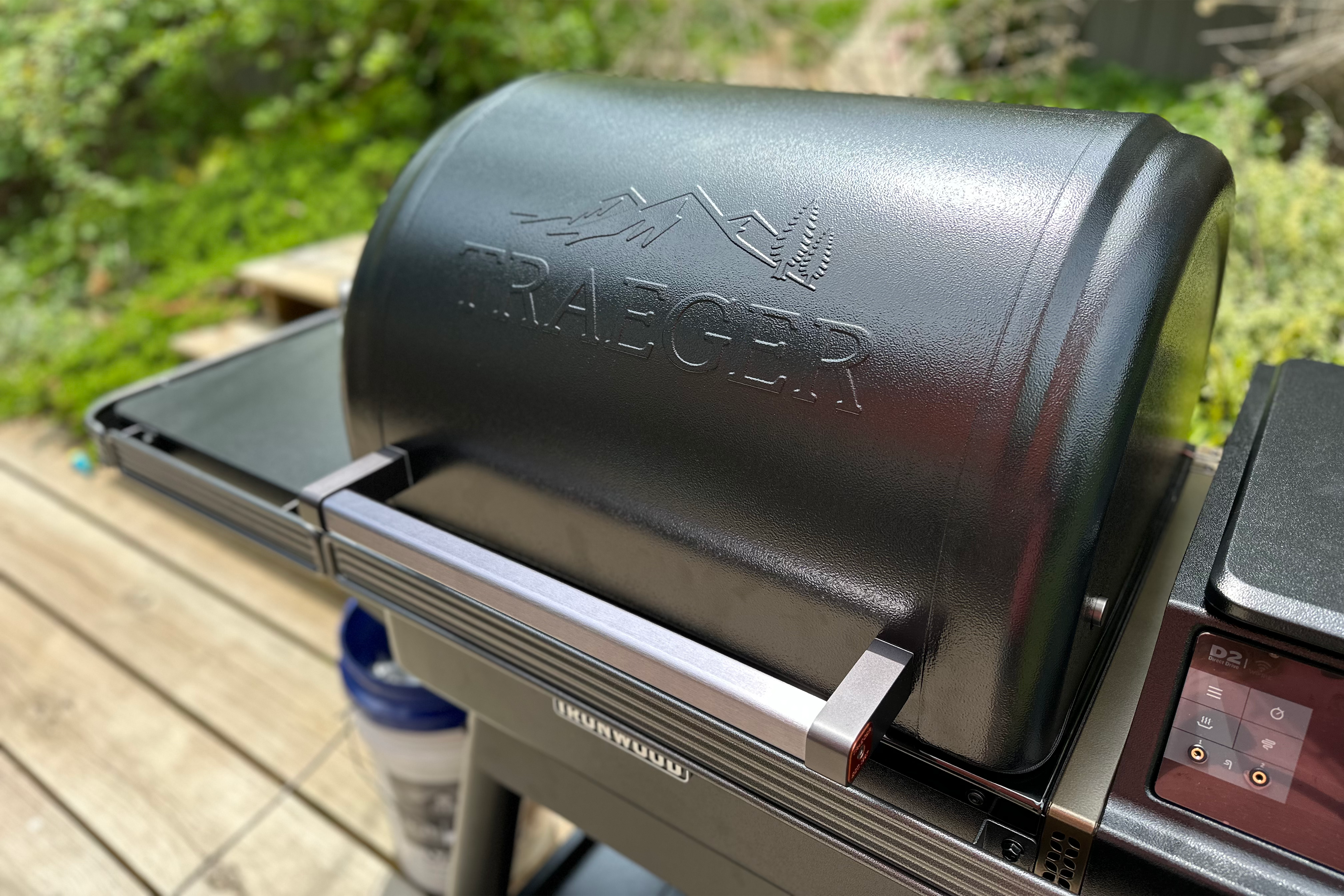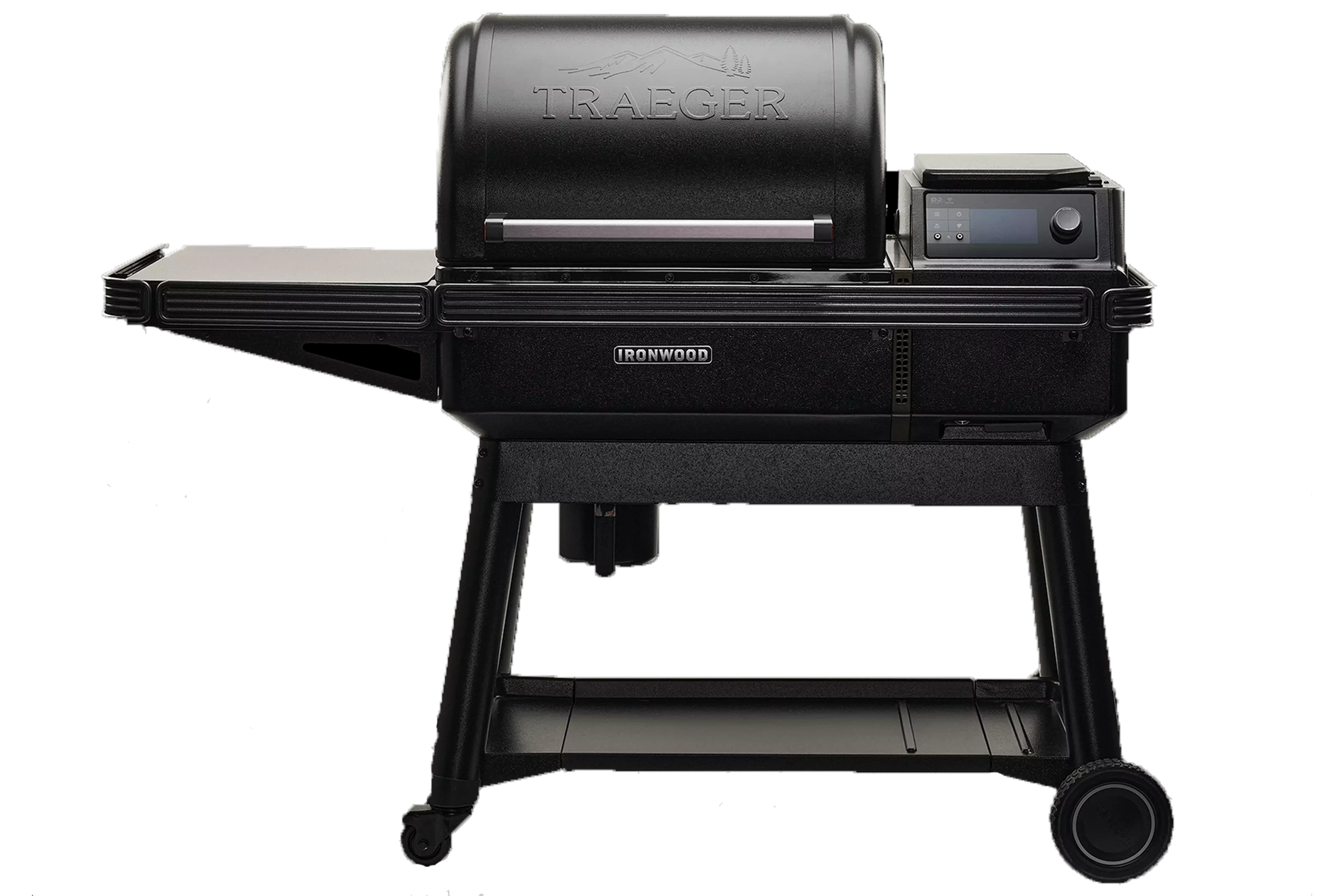Traeger Grills made quite a name for itself since it hit the market in 1986. So much so, in fact, that it garnered a massive cult following — #TraegerNation — that has brought the hobby of smoking briskets and ribs into the mainstream. Traeger isn’t the only brand out there doing what it does, but it’s hard to ignore its presence.
But with a Traeger comes an investment. How much? Well, you should probably consider putting aside at least $2,000, at minimum, to ensconce yourself into the delicious madness that comes with being a Traeger pellet grill owner.
But, is that all just crazy talk? Doesn’t that seem like a lot of money for a grill? Not if you want a grill that you can depend on for at least a decade. Especially if it can pull double-duty as a grill and a smoker.
Last year, Traeger relaunched its top-of-the-line Timberline series. The brand threw all sorts of bells and whistles into it and made improvements that pushed the Timberline past the pinnacle of the pellet grill mountain. And this year, Traeger decided to take some of those improvements and relaunch its mid-range Ironwood Series.
In short: With the new Ironwood series of pellet grills, Traeger proves that with a modest investment — and it is an investment — you can enjoy a top-notch home-grilled (or smoked) meal. With a beefed-up build and more premium features than the previous generation, the new Ironwood and Ironwood XL bring a pro-level experience to the masses.
Looking for something a little more compact? Check out our Buyer’s Guide to the Best Portable Grills.
- Main cooking rack: 396 sq. in.
- Top cooking rack: 220 sq. in.
- Total cooking space: 616 sq. in.
- Temperature range: 165-500 deg.
Pros
- Price-to-feature ratio
- Ease of use
- 10-year warranty
- Juicy leftover chicken
- The wide breadth of accessories
Cons
- Wired meat probes are a joke (and sound perverted)
- You’ll forget to turn it off at least 4 times… well, 5 times.
Traeger Ironwood Review
The Gen 2 Ironwood: Overview
The Ironwood series comes in two sizes: the Ironwood and Ironwood XL. The Ironwood ($1,799), which I tested, offers 616 square inches of cooking space, while the Ironwood XL ($1,999) offers up to 924 square inches. Both grills feature a full-color, digital touchscreen display, WiFIRE Wi-Fi connectivity, a 22-pound pellet hopper, wicked fast cleaning, and various other premium features that make your experience with the Ironwood beyond anything you would expect from a grill.
In typical Traeger fashion, there is a wide range of accessories, pellets, seasonings, and sauces that you can add on and use to take your grilling experience to the next level. But, if I am being honest, focus your money on the accessories and pellets. The flavor that comes off of this grill, without any seasonings and spices, is remarkable.
Regarding those accessories, you can take it to the extreme, but here are the ones I recommend based on how I tested the Ironwood:
- Full-Length Grill Cover ($140)
- P.A.L Accessory Hooks ($15)
- BBQ Grilling Spatula ($30)
- BBQ Grilling Tongs ($30)
- Your Favorite Bluetooth Speaker
- Craft Beer for Hydration
Obviously, those last two are totally optional (and not available from Traeger), but if you want to experience full-blown Americana, you need tunes and brews while you’re grilling. So, get right with yourself.
Old vs. New
As consumers, we all shake our heads when a company comes out with something new when it already has a perfectly good version on the market. In the case of the Ironwood, however, the improvements over the older 650 and 850 models are pretty substantial.
The biggest, and most impactful improvement, is the upgrade to a fully insulated hood. This not only helps cut down on pellet usage, but it creates a more consistent cooking experience, whether smoking or grilling.
From there, everything is about ease of use. The new Ironwood has a larger pellet hopper and a full touchscreen, which I will get into in the next section. But what really jazzed me up was the new EZ-Clean grease and ash management system.
Cleaning a grill is disgusting. It’s old food and gunk, stuck like concrete to any surface it touches. Accompanying the decay are smells of backyard barbeque parties from long ago — all festering in the dead heat of summer. In most cases, if you really want to clean the grill the right way, you need to take the damn thing apart, and it’s a lot of citrus-based cleaner and time.
With the Ironwood, everything slides down into the EZ-Clean Grease & Ash Keg, which has a removable and replaceable foil liner. You simply brush the grates, remove them, brush the steel basin in the belly of the beast, and remove the Keg canister to empty it. It slides in and out like the pot on a coffee maker.
Beyond that, the upgrades are all visual and structural. This is a brand-wide move to put the new Ironwood series more in line with the look and build of the new Timberline series — as well as the new Flatrock Griddle.
From the new side shelf and bottom shelf to the overall size and construction, the Ironwood Series looks formidable and uses its size and space wisely.
Mission Control: Intuitive Touchscreen, Single Dial
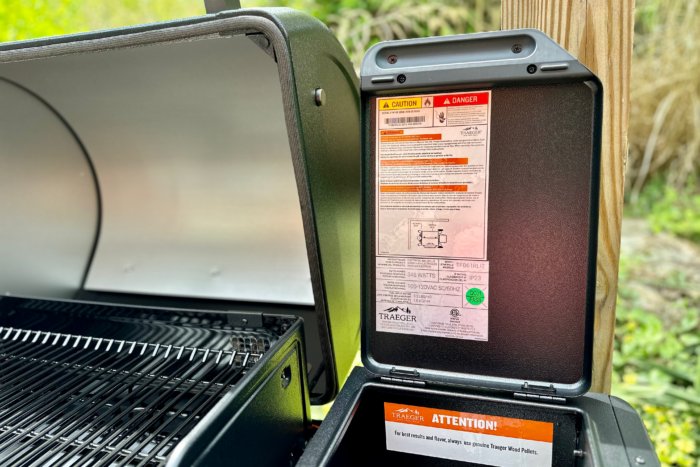
The new Ironwood series features a touchscreen display and dial that does everything from igniting the grill to setting the temperature and cooking time, and controlling how much smoke you put into the food.
The only effort you need to put into using the Ironwood is making sure your pellet hopper is full. But don’t worry, the Ironwood will tell you when that’s running low.
Though it’s not necessary, pairing the grill with the Traeger app is where the party really happens. By having the grill connected to your phone, you can set it and forget it, or make adjustments on the fly. The app mimics all of the controls on the grill but also has an endless catalog of recipes and tips.
By using the app with the grill, I have taken the guesswork out of making a meal for my girls and me (as well as the dog).
The Joy of Cooking Setup
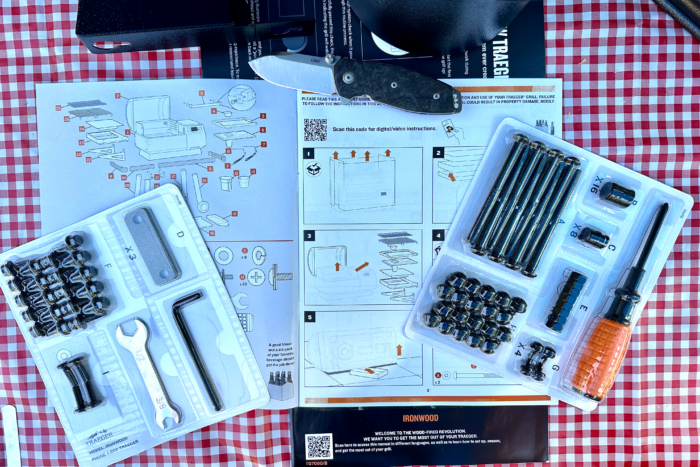
Like every other grill on the market, you have to build the Ironwood. And I highly recommend you do, as opposed to having some kid at the hardware store do it. You’ll appreciate the fruits of your labor more and it’ll spiritually enroll you in the adventure ahead.
I’m a big, stubborn guy, so I ignored the recommendation to have two people build the Ironwood. But in all reality, you should offer your neighbor a couple of cold ones and have them help you until you at least get the legs on and tipped upright. Either way, set aside at least 3 hours to get everything laid out and assembled as instructed.
Also, and this is big, avoid the temptation to use your own tools when building this bad boy.
Traeger includes all of the necessary tools you need to build the Ironwood. You’re going to feel the urge to upgrade to a socket wrench for the hex bolts, but don’t. This is especially important when you’re tightening up the legs, as the bolts are softer than your socket, and that socket will get stuck to the hex head, or — at the very least — round the ridges on the head so that you can’t easily tighten them with the included wrench.
In regard to setting up and seasoning the Ironwood, just follow the instructions on the screen. It will walk you through everything you need to do to make sure your experience goes smoothly. This includes naming your grill and getting it paired to your phone.
Propane vs. Pellets
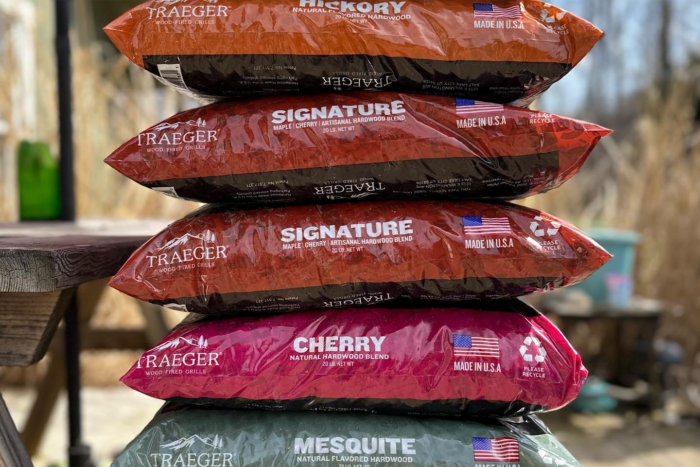
Cooking on a pellet grill is not like cooking on a propane grill.
Hank Hill would hunt me down and hang me for saying it, but grilling with pellets is way better than grilling with propane. The flavor is fantastic and with the variety of pellets on the market today, you can cater your experience to your taste buds.
I’ve been using Meat Church and Mesquite Pellets from Traeger, and wow! I have never had leftover grilled chicken the next day that was still juicy. But here we are, in flavor country.
And yes, you can use the Traeger like a traditional grill. Even though Traeger makes it pretty clear in all of its marketing, the Ironwood is capable of heating up to 500 degrees, which is the optimal grilling temperature.
At this heat, the smoke flavor is low and the wood flavor is high, but not high enough to take away from any natural flavors of your meat, poultry, or veggies.
That said, fire up some corn on the cob, in the husk, on the top shelf of the grill. I can attest that it’s amazing, and we’re really early in the season for having corn taste this good.
Two-Week Grill Test
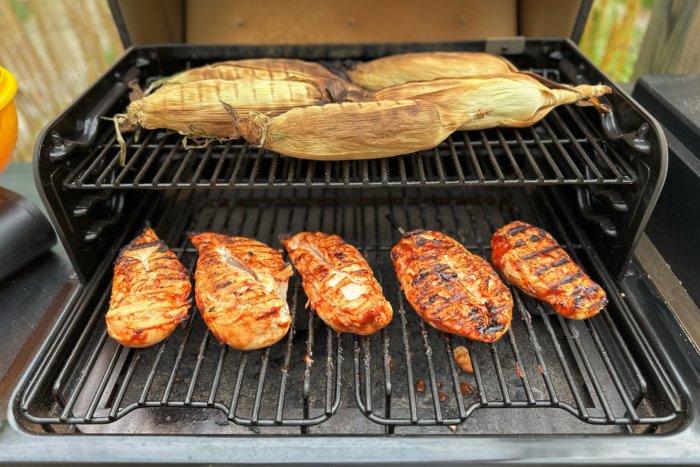
Though I haven’t smoked anything yet, I’ve been grilling on the Ironwood every night for 2 weeks. I’ve made steak, chicken, burgers, corn, stuffed peppers, and even hotdogs on the grill. And they’ve all been delicious.
Traeger also sent a bunch of different seasonings, and I have used them sparingly because I want to see what wood flavor is all about. They work wonderfully in unison, but there’s no need to overdo it with the spices. Trust me.
I’m a busy guy, being a single dad, so when things go easy, that pays off in spades. Because I have the grill connected to my iPhone, I don’t need to hover over it to find out when it’s preheated.
With the ability to set the timer and check the internal temperature remotely, all that’s left for me to do is flip whatever I’m grilling. I’m informed about all of the rest. I could even turn the grill off from the comfort of my hammock if I was feeling frisky.
One upgrade I did make was to a MEATER Plus thermometer. Yes, it’s another app on my phone, separate from Traeger’s, but it’s wireless. The probes that come with the Ironwood are not and can be a bit of a pain to use. For instance, I got burned trying to navigate behind the wires when the probe came out of the 2-inch-thick porterhouse steaks I was grilling and landed on my hand. That can’t happen with the wireless MEATER.
Traeger Ironwood: Overall
Twenty-two years ago, I dropped $800 on a Weber Genesis grill that I used for years to feed my family. Hell, I even got it in the divorce. But as my family grows and our demands for delicious food do as well, we’ve outgrown the Weber.
That same grill today would cost me $1,100. There’s no doubt in my mind it would provide years of delicious charred meals, but it doesn’t have all of the features and abilities that the Ironwood does. Weber does make its own line of pellet grills. In fact, its SmokeFire Sear+ is the same price as the Ironwood and the size of the Ironwood XL.
But it’s built off the same cooking elements as the Genesis series. Having cleaned that type of setup for years, and having replaced the “flavor bars” five times, I think I’ll stick to the ease of use of the Ironwood.
As far as size goes, it’s my two daughters and I (and the dog) here at the River Sisters Homestead, and I think the standard Ironwood is more than big enough for us. I would even go as far as saying that it’s more than ample for the occasional backyard party.
But if you’re the neighborhood hero and like to entertain, go big or go home and snag the Ironwood XL.
It might seem a little silly for a grill to have all of these creature comforts, but everything else in our lives does — so why not this, too? Yes, I laughed when I found out I had to plug in the grill. But 10 minutes later, I was running that extension cord down the bottom of my deck, hiding it away to look as professional as the Ironwood itself.
The big takeaway here is that the Ironwood series is more affordable than you might first think once you consider its features, build, and ease of use. I don’t want to smoke everything I eat, and the Traeger won’t smoke everything you cook on it. But I do enjoy a big brisket and some ribs, and I look forward to a crisp fall morning here in Connecticut when I can queue it up and walk away until they’re ready to enjoy.
Until then, it’s burgers and dogs in high style!
